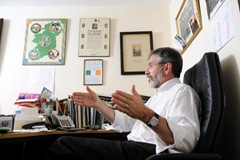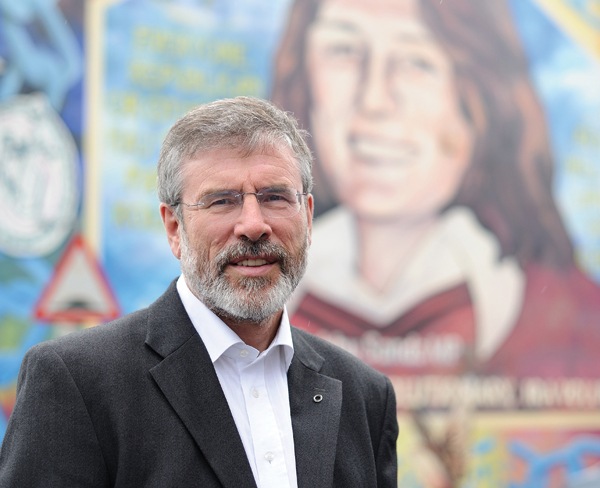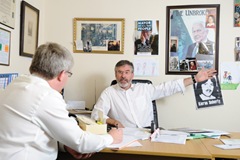The leaders: Gerry Adams interview
The Sinn Féin President discusses his roots, mentors and republicanism’s future direction with Owen McQuade in the latest in our series of interviews with party leaders.
Adams remembers clearly the first time he became interested in politics. It was an incident when he was going to school through the lower Falls district, to St Mary’s Grammar School in Barrack Street in 1964. “Even though I came from a republican family I wasn’t very politically conscious. I was nationally conscious but we weren’t force-fed republicanism.” He recalls the incident, when a tricolour had been raised on the office of a local election candidate, Liam McMillan. Ian Paisley had threatened to take the flag down if the RUC didn’t. Although the police removed it and republicans later replaced it, it was a “huge talking point in school and the district and there were three or four days of civil unrest. For the first time I saw RUC vehicles and riot squads and it whetted my appetite in terms of political consciousness.” He remembers going so far as to get a copy of the Special Powers Act.
In 1966 he had left school and was living with his family in Ballymurphy. It was the 50th anniversary of the 1916 rising and the writings of the leaders were popularised. Adams read Pearse’s ‘The Sovereign People’ and “bits and pieces of Connolly” and was already a member of Sinn Féin, which was then banned. “There were a lot of other things happening.” Anti-Vietnam war and local influences such as the Fleadh Cheoil, the West Belfast Housing Action Committee and he joined the Civil Rights Association in Belfast when it was founded. He was involved in the opposition to the building of Divis flats.
“There was no IRA as such,” he recalls. “The main focus of republicanism was political. It was around agitation and building popular support and no attempt to build militarily. For people like myself who were young and single it was a good time to be politically active. Things came to a crunch in late ’68 as the unionist state reacted against the civil rights activism.
“In 1969 I happened to be one of those people, and there were only a handful of us, who were active in republicanism in a period of struggle that was purely political agitation and protest as opposed to armed and conspiratorial. That’s the way it fell out.”
Adams claims he has always seen the republican struggle as political “in terms of its cause”. At different times he “got into bother”, even in the ’69 to mid ‘70s period, by saying there could be no military solution.
“It’s a political struggle and it has to be a political solution. But I would be telling you a lie if I didn’t say that I broadly supported the need for physical force republicanism. I don’t make any bones about that. I don’t glamourise that. I think that in the circumstances that people who wanted social justice in this part of Ireland that it was a legitimate response to what was occurring at the time. That isn’t to say that I was uncritical. I would be very critical of some dimensions of it but I always thought it was a response in the absence of an alternative and when we got an alternative – and it still intrigues me that it took so long – but when we got an alternative nobody could argue for an armed struggle. It has been a long and traumatic journey for everybody here.”
When asked about his influences and mentors, Adams gives a thorough analysis of those people who influenced him over the years.
“I suppose because I have been around for quite a long time, individual people would have influenced me at different times.” When he was 19 these were Ché Guevara and Fidel Castro, and radical Colombian priest Camilo Torres also comes to mind.
“But people who have stayed pretty constant to my political compass were, and are, James Connolly, Pearse, and Liam Mellows. I find myself very influenced in a general sense by women – this sounds a bit corny – but ordinary women that I work with and meet.” Bobby Sands, the other hunger strikers and Nelson Mandela are “iconic” figures. Mentors include Frank Cahill who was heavily involved in the Ballymurphy Tenants Association, his grandmother Adams “who was a republican and someone who believed in the value of education and someone who gave me some core values” and his mother Annie Hannaway. “You end up being really lucky to meet really good people who have influenced you.”
To him, Sinn Féin’s ideology in brief is about “republicanism, an independent Ireland, citizenship, empowerment of people, it’s about social justice and the rights of citizens.” Essentially, that means that people are sovereign and everybody has the birthright to be treated equally.
There is no doubt that the Sinn Féin of 2009 looks different from that of 1969 or 1919 but his contention is that the values are constant: “Since its founding Sinn Féin has changed and been through many shapes but at its core, the mission statement is the 1916 Proclamation.”
The mark of any leader of any philosophy or movement is to “make it relevant in your own time”, he adds. “This is not 1916, it’s not 1798, it’s not 1969, it’s today, 2009. What we have to do in the modern Ireland is to engage with it and try and persuade people that we are better than what we have at the moment. We can have a decent society which is just and values citizens.”
Being in government, Adams says, has not changed Sinn Féin’s principles or objectives but it is a “totally different” mode of political struggle. “One, we are not a single party government and we’re not a voluntary coalition. You’re in a government which has other parties which are totally opposed to some of our philosophies. So that means you have to compromise. You don’t have the authority to follow through all the time as you feel you should.”
He also rejects the observation of one political commentator that Sinn Féin is good at communicating with its electorate but not so good at government: “We have delivered and have more to do.”
Adams does not accept Eamon Mallie’s observation that the DUP have been much better at government than Sinn Féin. “First of all the DUP don’t want to be in government with us. Sin é [that’s it]. No matter how much lipstick you put on it, they don’t want to be in government with us. Some of them know that the only way they are going to be in government is on these terms and they’re not comfortable. For others it is very difficult to stomach that prospect – and you can see the fracture lines – but they have become increasingly pragmatic and realise we need partnership and equality and so on.”
Adams adds: “We’re long-termers, marathon runners. Some of what the DUP does is transparently juvenile. Look at the last European elections – we are the party that stopped Sinn Féin from doing A, B, C and D.” He recalls Ian Paisley saying to him: “I wish he wouldn’t do that”, talking about someone else in his own party: “How do they expect you to do business with us when they are out there trumpeting.”
Delivery comes across as an important priority: “So the business about being good at government or not being good at government is about delivering to citizens. It isn’t about scoring points against your political opponents.”
Local delivery
At a local level, bureaucracy holding up delivery frustrates him. “Now we are in a transition and to get people who are working in the system, the permanent government, into a new dispensation is quite challenging.”
The West Belfast Taskforce, which brought together civil servants, community activists and business people “liberated” the civil servants involved.
“We’re very unique in West Belfast. It’s a very democratic and activist campaigning ethos,” he comments. “So the engagement between the bureaucrats on any of these issues – An Ceathrú Gaeltacht, the Gaeltacht Quarter, the development of Conway Mill, the rapid transit – all of that liberates the civil servants and gets them into a different mode. Some of them may be sectarian and may have a class attitude to working people but a lot of it isn’t that. It is just a mode, a cultural of working.”
Adams sees governance as “empowering citizens and [that] makes them part of the process for change” and for those running the system “to make the better at that and more accountable and get more job satisfaction.”
He still considers planning a “disaster”, though, with acres of housing still being built without proper public spaces.
As the constituency’s MP, he has found himself representing unionists as well: “You’d be surprised at the consistent trickle, even at the height of the conflict, of people clearly from unionist neighbourhoods who used this constituency office. That trickle has now become a stream and there is a bigger involvement in those by Sinn Féin in a very quiet way in those disadvantaged working class unionist areas.”
“People there aren’t going to become republicans,” he admits. “They’re not going to vote for Sinn Féin but they look to us on educational needs, housing needs, redevelopment and physical regeneration and I think that is good for everybody.”
Sectarian division is evident in the peace walls and also in less obvious ways along the Malone Road, he suggests, and the churches have a “big responsibility” to tackle that. “I remember going into St Anne’s Cathedral one day and being a bit appalled by all the imperial imagery. I’ve never been able to get my head around all these so-called Christians could be so divided and so distant from the teachings of Christ.”
Although Adams spent his formative years in West Belfast, he also worked for a while in a Belfast city centre public house the Duke of York. The clientele was mixed, “very good decent Protestant and Catholic people” and it was “a very good experience” for him. “The people who used it were more so political with a small ‘p’, members of the old Northern Ireland Labour Party, which was just around the corner. Republicans used to use it including some of the Connolly party people. Journalists from the News Letter. People from the arts.” Adams rattles off a list of names from each of these groups which has been a feature of the interview – he has a great capacity to remember individual names even from the distant past.
Southern ambitions
What the party is trying to do is “unprecedented” but while it is organised in all 32 counties, that structure is sometimes “skeletal”. “Even the process of leading our own broad constituency through seismic changes has been really time-consuming and stamina-sapping. So we are only in the last number of years turning to the process of building party structure and capacity [in the South].
“We got a bounce in 2004. In my view it was a peace process bounce. There was an over-stated and over-inflated sense that we would do much better in 2007. That was not my view – I thought we would have five seats and maybe stretch to six.”
Sinn Féin is perceived as a northern party and faces challenges in overcoming apathy in the South towards the North.
“The problems are the same,” he argues. “From a republican analysis we would argue that the root cause of a lot of this is the actual partition of the island. When we were partitioned there was the establishment of two conservative government states.”
However, he sees that the solutions will be different. Looking at his desk he points to documents on NAMA, the Tax Commission, rapid transit and local delivery mechanisms. “Trying to grapple with all of that and it’s very challenging. The only way we can do it is to develop the southern leg of our political movement and we need to be patient. We are not going to do this overnight. It is only now we are starting to systematically apply ourselves to that.” So far, Sinn Féin has been most successful when ‘bottom-up’ grass roots support was grown e.g. Cavan and Monaghan, parts of Dublin, north Kerry and Louth. “If it isn’t happening locally it won’t be happening nationally. That maxim is well founded,” he adds.
Unity
Meanwhile, an all-island “shape” will come into being, Adams predicts, in politics, economics and society: “That’s just going to keep happening and to be fair to civil and business unionism they both know that and it is to their advantage.”
He agrees with Martin Mansergh’s comments, in an interview with agendaNi last year, that a united Ireland can be viewed as a continuum.
“We have to be prepared to look beyond this notional, aspirational vision of the four green fields joining together. If we have to go through various transitional modes, a united Ireland has to be a united Irish people. So clearly there has to be the physical unity of the territory but we have to make unionists comfortable. It has to be their united Ireland and that they have a sense of ownership without us surrendering any of the principle. It’s about us developing our own destinies. For republicans, it’s never been about a change of flags. I think it would be a very fine thing to have an end to partition and an end to British rule in Ireland. It also has to be about social conditions, justice, cohesive and empowered communities.”
When asked if he has any doubts about the path taken in recent years, he replies: “I remember when we were persuading people to implement the ceasefire and I said to people, look, what we are advocating is the hard thing. The easy thing is either you continue on until you run out of steam or you go to jail. We will meet, those of us who survive, at commemorations or in pubs and it will be grand, people will think we’re sound, we kept the struggle going or we can try to move into to a political mode and we are going to be described as ‘seller-outers’.”
On a similar point, does he have empathy with the DUP? “No not really, because at least we engaged. We went out and democratically argued the thing out. The DUP didn’t do any of that. Part of the strength was Paisley’s authority within the party. I can understand how those who think they have sold out because there was no process they could engage in. One minute Ian Paisley was saying no and the next minute he was saying yes. Now I think he did the right thing and in fairness to him he was very gracious and I think he was very good for everybody – the work he and Martin McGuinness was good for us as a people.”
He has seen “two or three occasions” when Sinn Féin members were nervous about going out onto doorsteps on the back a party decision “but when they started to rap doors they discovered that people had it already sussed.”
Supporting the PSNI was one example: “One of the big empowering moments was doing the policing town hall meetings which were hugely well attended. For me it was amazing to see a crowd of 600 or 700 strategising – a mass strategy meeting.”
Finally, some commentators have speculated that Adams has an eye on another presidency – that of Ireland. However, he replies firmly: “Never had any, don’t have any and won’t have any. I’m an activist and I’ll be an activist until I’m six foot under. I like to be working with people on the ground.”







